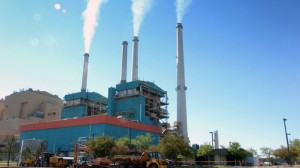The Trump Administration has been hostile to environmental protections in both rhetoric and policies, arguing that rules to protect clean water, air and public lands have undercut our economy. The president has signed rollbacks of environmental regulations and proposed a budget slashing funds for the U.S. Environmental Protection Agency (EPA) and other environmental programs. Meanwhile, tomorrow promises to bring a new executive order to unwind President Obama’s Clean Power Plan, which aims to reduce pollution from the electricity sector, and to ease restrictions on coal extraction on public lands.
How will these policies affect the San Francisco Bay Area — and beyond? What will the future be for programs like bay restoration, regional transit improvements, and state policies to boost clean cars?
To discuss these questions, I’ll be moderating a panel tonight at 7pm on City Visions, on local public radio KALW 91.7 FM San Francisco.
My guests will include:
- Jared Blumenfeld, former regional administrator of the U.S. Environmental Protection Agency under President Obama
- Anne Notthoff, Director of California Advocacy, San Francisco and Sacramento, for the National Resources Defense Council
- Michael Wara, Associate Professor of Law, Stanford University
Tune in or stream live and call or email with your questions!
UPDATE: archived audio is now available.
 Could California’s entire set of vehicle emission standards, including its zero-emission vehicle program that has helped launch the global electric vehicle market, come under federal assault? It’s a worst-case scenario that would require congressional action, but it’s amazingly within the realm of possibility.
Could California’s entire set of vehicle emission standards, including its zero-emission vehicle program that has helped launch the global electric vehicle market, come under federal assault? It’s a worst-case scenario that would require congressional action, but it’s amazingly within the realm of possibility.
California has unique authority under the federal Clean Air Act to regulate vehicle emissions. That authority requires the state to first seek a “waiver” from less-stringent federal standards from the U.S. Environmental Protection Agency. The EPA always granted those waiver requests until the George W. Bush administration came along. His administration refused to grant a waiver for the state to regulate greenhouse gas emissions from tailpipes.
California sued, but the Obama Administration took office before the case was resolved and then granted the waiver. But now new EPA administrator Scott Pruitt is looking not only to refuse to grant future waivers but possibly roll back previously granted ones (Buzzfeed covered the issue on Tuesday with some quotes from yours truly). It would be an unprecedented step that would be sure to be challenged in court.
But the even deeper concern is that the litigation might prompt Congress to revoke California’s waiver authority altogether. The Atlantic has a great piece on the situation, including this passage quoting Debbie Sivas at Stanford:
She feared that this fight in the courts would accompany a political fight in Congress, as the administration would seek to amend the Clean Air Act to remove California’s waiver power before they lost the lawsuit.
And—almost in preparation for that battle—she asked Americans to take a step back and examine why regulating greenhouse gases from cars is important.
“It feels like this very technical thing about, ‘blah blah, waivers, blah blah blah,’ but it’s a very important part of the climate policy,” Sivas told me. “People aren’t going to stop driving, really. And transportation’s 40 percent of carbon emissions. The only way to get [those emissions] down is to get [fuel] mileage up. If the feds are going to take their foot off the gas—and to fight the states who are doing it—it could be a huge setback,” said Sivas.
There’s a lot at stake in this fight. Federal fuel economy standards are prompted by California’s authority on the issue, and future standards could definitely be at risk. I have a lot of confidence in California’s legal team to fight this assault, but it would be a major setback for the time being.
But if Congress were to revoke the waiver status, and even retroactively apply it, the future of both cleaner gas-powered cars and the nascent electric vehicle market would be at tremendous risk.
Media reports indicate that Trump is set to nominate Carl’s Jr. CEO Andrew Puzdur as secretary of labor. First, full disclosure: I don’t like Carl’s Jr.’s burgers and vastly prefer In-N-Out and Five Guys. So there’s my bias out front.
That said, I had the opportunity to hear Puzdur give a keynote address at a 2014 law conference at Chapman University in Orange County, where I gave a talk on environmental law. My take on him is now more alarming for me to re-read, given the position of power he appears to have been granted.
You can read the whole post here, but here’s the long excerpt:
The low point for me came with the lunchtime address from Carl’s Jr. CEO Andrew Puzdur (video here), who gave a largely a-factual, a-historical takedown of an imagined socialist California. Puzdur assumed the chairmanship of the Southern California-based fast food chain in 2000 from Anaheim-based Carl Karchner, the founder who starred in many of its TV commercials. Puzdur revived the company into a global chain.
Puzdur described numerous legitimate-sounding complaints about doing business in California. He cited the long wait times to get a building permit, the work rules that keep store managers from filling in on various store duties in times of need, and the required rest breaks without flexibility that keep stores from being able to serve large customer groups that come in unexpectedly. Meanwhile, state overtime rules prevent the schedule flexibility that would come with a 40-hour workweek rather than mandatory 8 hour days. While I’m sure there are good reasons for these laws, it all sounded like typical complaints from a CEO.
But then Puzdur went off the rails. First, he simplistically painted world history as a progression from feudal servitude to the freedom provided by capitalism (glossing over the global slave system that capitalism boosted), now under threat from “socialism.” He blamed teachers for the poor state of California’s educational system, ignoring that the state ranks last in per pupil spending. He dismissed the recent economic success and low unemployment in the San Francisco Bay Area as occurring in just one “enclave” of the state (home to 7 million people). And he cited California’s onerous regulations as the reason he won’t open many more restaurants in the state, when consumer surveys repeatedly indicate that Carl’s Jr. food is nowhere near as good as In-N-Out (or Five Guys, for that matter).
One revealing moment came when the mayor of Anaheim, a Karchner family friend and observant Catholic, objected to Carl’s Jr. racy TV commercials. Puzdur expressed no remorse, saying the commercials saved the company and featured “beautiful women” who enjoy doing the spots. Puzdur and his all-male management team see no reason to object to them.
I guess his appointment shouldn’t exactly be a surprise, given the extreme picks in his cabinet so far. And of course, closer to my field, we now have a climate denier nominee, Oklahoma Attorney General Scott Pruitt, set to run the U.S. Environmental Protection Agency. My colleague at Legal Planet Cara Horowitz has a depressing take on that nomination.
As they say on Game of Thrones, winter is coming.
 The (aptly named) Union of Concerned Scientists released a report this week showing that the U.S. Environmental Protection Agency’s new power plant rule sets a national renewable energy target that is barely above federal business-as-usual projections.
The (aptly named) Union of Concerned Scientists released a report this week showing that the U.S. Environmental Protection Agency’s new power plant rule sets a national renewable energy target that is barely above federal business-as-usual projections.
This rule was supposed to be one of the Obama Administration’s signature climate change achievements, issued under the Clean Air Act pursuant to a 2007 Supreme Court decision requiring it. So what gives? As one of the study researchers commented:
“The EPA was obviously feeling pressure from Congress and states over the rule and wanted to come up with something they thought would be defensible,” Steve Clemmer, director of energy research at UCS, told ThinkProgress. “I think they ended up erring too far on the side of being conservative about renewables. When the EIA — not an agency that’s seen as being optimistic about renewables — says we’re going to pretty much get to that level without the Clean Power Plan, that’s pretty pessimistic and unrealistic really.”
Given that the rule is still in draft stage, there is time to improve it. The study authors recommend that EPA bump up the renewable goal considerably, noting that states can cost-effectively produce nearly twice as much renewable electricity as the agency calculated. And it’s worth keeping in mind that the renewable energy target is only one part of the rule, which also includes energy efficiency and other greenhouse gas-reducing measures.
Given the environmental weakness of this part of EPA’s draft regulation, it’s ironic that congressional Republicans are complaining that EPA worked too closely with environmentalists in crafting it. For my part, I certainly hope EPA will be more receptive to input on this issue from the environmental community going forward.
 Yes, federal cap-and-trade legislation went down to defeat in 2010, along with most of Obama’s progressive agenda. The once-Republican idea instead morphed into a political kill phrase for the right-wing, which they successfully branded as both taxation and regulation in one big ball of awful. But as Politico points out, cap-and-trade is actually alive and well at the state level, and it could be poised for expansion with EPA’s coming rule to reduce greenhouse gases from coal-fired power plants. California launched — and will be expanding — its program to reduce greenhouse gases, while nine northeastern states take part in the Regional Greenhouse Gas Initiative (RGGI) trading program. As Politico notes:
Yes, federal cap-and-trade legislation went down to defeat in 2010, along with most of Obama’s progressive agenda. The once-Republican idea instead morphed into a political kill phrase for the right-wing, which they successfully branded as both taxation and regulation in one big ball of awful. But as Politico points out, cap-and-trade is actually alive and well at the state level, and it could be poised for expansion with EPA’s coming rule to reduce greenhouse gases from coal-fired power plants. California launched — and will be expanding — its program to reduce greenhouse gases, while nine northeastern states take part in the Regional Greenhouse Gas Initiative (RGGI) trading program. As Politico notes:
Those ranks could grow because of EPA’s upcoming climate regulation, which is expected to give states wide latitude in how they reduce the greenhouse gas pollution from existing power plants.
If EPA, as expected, allows states to develop cap-and-trade programs to reduce carbon from their coal-fired power plant sector, then many states may begin setting up trading platforms that could go a long way to detoxifying the political attitude about cap-and-trade. And once the political opposition melts with the realization that the economy won’t crash with emissions credit trading, it will be politically and structurally easier to incorporate more sources under the cap. Eventually, with a strong network of states using cap-and-trade to minimize greenhouse gas emissions, the federal government may even find it politically safe to develop a national trading platform, with the state markets as a foundation.
Back in 2009, I opposed the cap-and-trade program developed in the federal Waxman-Markey bill because I thought it gave away too much to industry, while undercutting both California’s and EPA’s more promising efforts. While I’m disappointed the US didn’t act faster and better on climate change at the national scale, I’m hopeful that this state-by-state approach, prompted in part by long-overdue EPA action, and unfettered by the industry giveaways we saw at the federal level, will have a better chance of delivering sound policy and actual carbon reductions.


